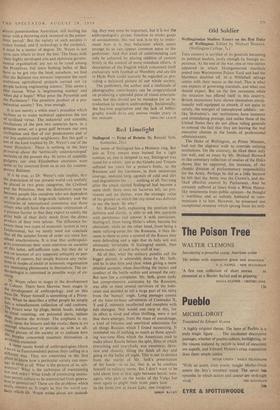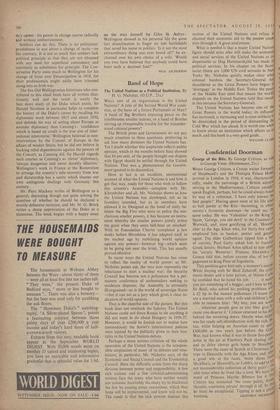Old Soldier
Wellingtonian Studies: Essays on the first Duke of Wellington. Edited by Michael Howard. (Wellington College, 7s.) THIS country is terrified of its generals becoming its political leaders, justly enough by foreign ex- perience. At the end of the war, one or two stories appeared in which Montgomeroid marshals jeeped into Westminster Palace Yard and had the Members doubled off to a Whitehall salvage centre with their maces at the trail. This is what one expects of governing marshals, and what one should expect. But on the few occasions when the situation has offered itself in this country, British institutions have shown themselves excep- tionally well equipped to absorb, if not quite to satisfy, the energies of unemployed soldiers: un- like Slobodnia's, our institutions have immense and intimidating prestige, and unlike those of the United States they do not allow ruling generals to conceal the fact that they are leaving the real executive choices in the hands of professional administrators.
The Duke of Wellington, as Prime Minister, had not the slightest wish to override existing institutions. On the contrary, he liked them only too well, and an essay by Mr. Michael Howard in this centenary collection of studies of the Duke shows that he approved, for instance, of the chaotic division of parliamentary responsibility for the Army. Perhaps he did so a little because he felt that the Army was the Crown's, and dis- liked effective control by Parliament. And he certainly suffered at times from a White House- like remoteness from public opinion—he thought it worthless and so nobody bothered to com- municate it to him. However, he possessed one exceptional resource which sprang from his mili-
tary career : his power to change course radically and without embarrassment.
Soldiers can do this. There is no politicians' prudishness in war about a change of tactic—on the contrary. It is not so much that soldiers lack political principle as that they are not obsessed with any need for superficial consistency and continuity as substitutes for principle. The Con- servative Party owes much to Wellington for his change of front over Emancipation in 1818, for their professionals might easily have trimmed along into an Irish war.
The five Old Wellingtonian historians who con- tributed to this small book have all written illus- triously well and the result is surely the best short study of the Duke which exists. Sir Harold Nicolson in particular helps to complete the history of the Duke's career by recalling his diplomatic work between 1815 and about 1830, and defends his way of setting about t urope as sounder diplomacy than Canning's: 'confidence which is based on credit is the true aim of inter- national intercourse.' Wellington believed in non- intervention by the Concert of Europe in the affairs of weaker States, but he did not believe in backing rebel dependencies against the powers of the Concert, as Canning did. Sir Harold regards such courses as Canning's as 'clever' diplomacy, 'always dangerous and never durably effective.' Wellington's work in France at the Restoration to arrange the country's safe recovery from war and dictatorship has a sanity which shames our own ambiguous dealings with Germany this century.
Mr. Piers Mackesy writes of Wellington as a general, discussing though not quite solving the question of whether he should be declared a mainly defensive tactician, and Mr. M. G. Brock writes a sharp appreciation of the Duke as a statesman. The book begins with a happy essay on the man himself by Giles St. Aubyn : Wellington showed in his personal life the same tart disinclination to linger on lost battlefields that saved his name in politics. 'Is it not the most extraordinary thing you ever heard of?' he ex- claimed over his own choice of a wife. 'Would you ever have believed that anybody could have been such a damned fool?'
NEAL ASCHERSON















































 Previous page
Previous page